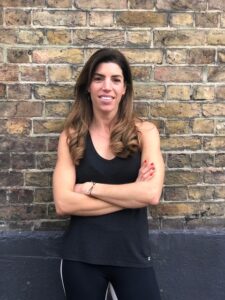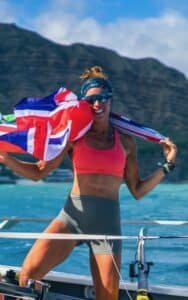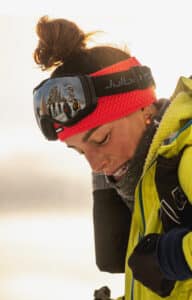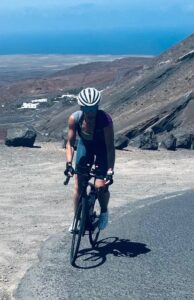 BBC News
BBC NewsBorrowing was £17.4bn last month, the second highest October figure since monthly records began in 1993.

Vicki Anstey
I grew up in North Yorkshire in a tiny village in a fairly remote part of North Yorkshire. I went to Bristol University and really thrived there; I read French and loved it and lived in France for a year as part of that degree. I then went straight into the world of advertising and worked both agency side and then, more latterly, on the client side.
I spent about a decade in advertising, but got to a point of burnout. I started to neglect myself and invest a bit too heavily in the slightly hedonistic lifestyle that advertising involves. I was leading Ikea’s advertising strategy at the age of 24 and managing multimillion media and production budgets. It was a huge upward learning curve and I thrived on that but it was also a lot of pressure.
I moved sideways out of advertising for a little while, and joined a social enterprise called We Are What We Do. Their whole ethos was about engaging people in small actions. It was a wonderful organisation and felt so much more fulfilling, but I still hadn’t really found my groove.
I ended up taking a U-turn and going into the fitness industry largely because I had discovered this incredible method called Barre based on ballet movement which literally transformed me physically. Barre is a strengthening and conditioning component of ballet, and essentially consists of all of the movements that a ballet dancer would do in order to prepare themselves to dance and to develop, build and maintain the right kind of structures and posture in their bodies.
I stumbled on this methodology and was completely hooked. With my advertising hat on, I realised that more people needed to know about this incredible methodology and if it could change me and my physique then it could also change the lives of other people.

I therefore took a bit of a gamble on setting up a studio here in London in Richmond and that was the first dedicated Barre studio in the UK. Nobody had ever heard of Barre and I was taking a huge risk. I took on an old office space in Richmond and created a studio that felt like a home from home. People came – and they queued around the corner to be a part of it. I ran that business for 12 years.
However, over the course of that 12-year period I left a very long term relationship. I had been in that relationship for 20 years, married for 12 and I found the relationship stifling, and more latterly quite coercive. It didn’t enable me to be the best version of myself and it took a really long time for me to get the courage to leave. My childhood had conditioned me for that kind of relationship. I grew up thinking I had to live up to a certain narrative and stay in my lane and live quite a gendered expectation of how I would go on to live my life.

After I left the relationship, I heard that SAS: Who Dares Wins was inviting women to apply for the programme. I mentioned this to a few people and I was encouraged to apply for it which I did and then I ended up on that programme and really discovering what my capabilities were. It was quite a life-changing experience and I got through to the final stages of the show.
There was a lot of press surrounding it because it was the first year that women participated so there was a lot of expectation and speculation about how we would be treated and whether it was right or not. Even the team of special forces operatives who run the show weren’t quite sure how it would all work out. I had to face fears I had had throughout my life, such as heights and water. I had to really believe in myself.
What I realised from doing the show was that embracing vulnerability is a very powerful thing. The idea of facing my fears became quite intoxicating and I entered this phase in my life where I said yes to everything. I was at a press event for Who Dares Wins and someone asked me if I would like to row an ocean and I just instinctively said yes. I had grown up with this fear of deep open water as I had had a near drowning incident when I was 12 with my sister and just avoided going in deep water my whole life.
To take on this new task, I ended up doing cognitive behavioural therapy and open water swimming coaching. I had various panic attacks along the way trying to deal with the underlying reason for that fear in the hope that my fear responses wouldn’t threaten my life or the lives of others that I was on the boat with. Then I embarked on this huge campaign to row across the pacific from San Francisco to Hawaii for a distance of 4,000 kilometres. We got the boat ready, and raised £70,000 worth of sponsorship. We packed our boat up with all of the kit and supplies that we needed – and then Covid happened and the race was cancelled.

That was soul-destroying. The two crew mates who I was meant to row with, and who I had known for a significant period of time, didn’t defer their places so they weren’t able to do it at any further point in the future. I had the choice either to walk away from the whole thing or to find new crew mates. There were too many people involved to let down. It’s not easy to find people with the resources and capabilities and flexibility to do something like that but I did eventually find them. Since we were in lockdown, I didn’t meet one of them until we got to the start line in 2021.
We had to go through all the processes of taking on skills and assimilating knowledge that you need to do an ocean row through lockdown. The gyms were all closed so we trained in our living rooms. You have to learn chart navigation, you have to master radio communication, you have to do first aid at sea courses. All sorts of courses were required for participation so we did a lot of that on Zoom.
We set off at the end of May 2021 and we arrived 60 days, 17 hours and 6 minutes later. Sadly, the team dynamic from the start was really problematic. There was some really bad behaviour – a lot of psychological game-playing, stonewalling, and bullying isolation tactics. I found it a very difficult experience. It’s important to remember that in the run up to the row we also hadn’t had the opportunity to spend time together, and therefore to explore our reasons for doing it, and to share our insecurities and fears. It was a really hostile environment.
I was also seasick for 23 days which was very debilitating. When I was off the oars I felt horrendous. The truth is that you can’t let conflict escalate on a tiny boat in the middle of an ocean so I really had to just tolerate and accept the situation I was in. It wasn’t particularly enjoyable but we did pull together as a team at times and ultimately we got the world record.
I learned a lot through that process, not least about how to manage your thoughts and emotions and how to tolerate really emotionally challenging situations where there is literally no way out. As a result of my experiences, I have become a stress and resilience coach. I am a qualified coach of a mind-set methodology that was developed for the All Blacks Rugby team back in 2001 when they kept losing at World Cup Finals.
I have become really fascinated about how our brains work with thought and fear and stress and how we are more in control of that than we think and how important choice and autonomy is. For people in toxic environments it is helpful to be reminded of the fact that we are ultimately in control of our lives however difficult and challenging our situations might be. One thing that we are always in control of is how we think about things and therefore how we influence our emotional responses.

The thing I try to make really clear is I am not advocating that emotionally challenging workplace situations should be tolerated but if there is a situation that you can’t get out for a period of time – as I couldn’t on that boat – then there are some really useful strategies that you can employ to get on top of your thoughts.
It’s about understanding how our stress responses work. We can regain perspective, take a step back, and choose what kind of head state we want to be in in a given situation. That’s a skill. You have to practice it. It’s not something that you master and conquer and become an expert in for the rest of your life.
What makes a difference is having that little bit of biological literacy, and understanding of basic neuroscience. If we don’t do that, we can be really hard on ourselves. These days, we get extremely stressed about things that are not life threatening at all so our stress responses are completely at odds with reality. If we understood that, we would be able to cut ourselves a lot more slack.
After I did the row I was left with a sense of lost faith in teamwork, and brought the whole campaign to an end. I made myself a promise that I wasn’t going to become this person who had to keep doing more and more crazy things but apparently I have become that person. I just kind of knew that I needed to put some things right.
So I asked a friend if she would run across the Arctic with me. We did a 250 kilometre footrace carrying everything that we needed to survive and it was an incredible experience in minus 35 degree temperatures. You literally couldn’t stop or you would get hypothermia or frostbite so it was very much about regulating your pace, and not getting too hot, or getting too cold. I have also done another ultra-distance run another 250 kilometres across Kenya – in obviously, completely different conditions.

I am now training really hard to do The World’s Toughest Bike Race (The Race Across America) which is a 3000 mile West to East Coast race. It’s quite established in the US, but not that well-known in the UK. We are a team of four women, and hoping to beat the world record which is 6 days 15 hours.
That’s fast. We have to do an average of 19.3 miles per hour, so it’s non-stop 24 hours a day, with the four of us on a shift rotation pattern. We will get to sleep a bit but only in vehicles that are constantly moving. I am not a cyclist any more than I was a rower so for me it’s all about showing people that they can do anything and train capabilities that perhaps they didn’t think they had.
For more information go to http://vickianstey.co.uk